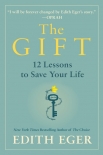Gift : 12 Lessons to Save Your Life Edith Eger (pdf e book reader TXT) 📖

- Author: Edith Eger
Book online «Gift : 12 Lessons to Save Your Life Edith Eger (pdf e book reader TXT) 📖». Author Edith Eger
My patients say it all the time: “I want him to…” or, “I want her to…” But you can’t want something for another person. You can only discover what’s right for you.
This is one of the most important tools for managing conflict: stop denying someone else’s truth. I love a good tongue sandwich. But my friend says, “How can you eat that? I get sick just thinking about it.” So who’s right? He’s right for him, and I’m right for me. You don’t have to agree. You don’t have to give up your truth—and please don’t ever do that! Freedom comes in letting go of the need to be right.
When I realized decades after the war that in order to heal I had to go back to Auschwitz and face the past, I invited my sister Magda to come with me. We had kept each other alive when we were prisoners; we had been each other’s reason to live. I wanted to go back with her to the place where our parents were murdered. To face what happened, to grieve, to be at the site of constant terror and death and say, “We made it!” But she thought I was an idiot. Who would willingly return to hell? My sister, the only person on the planet who shared so much with me, the person to whom I credit my very survival, had a completely different response to our common experience. And neither one of us is wrong or right, better or worse, healthier or unhealthier. I’m right for Edie, Magda’s right for Magda. We are both human—beautiful and fallible, no more, no less. And we’re both right. I went back to Auschwitz alone.
This is what I think Jesus meant when he advised us to “turn the other cheek.” When you turn the other cheek, you look at the same thing from a new perspective. You can’t change the situation, you can’t change someone else’s mind, but you can look at reality differently. You can accept and integrate multiple points of view. This flexibility is our strength.
It’s what allows us to be assertive—not aggressive or passive or passive-aggressive. When we’re aggressive, we decide for others. When we’re passive, we let others decide for us. And when we’re passive-aggressive, we prevent others from deciding for themselves. When you’re assertive, you speak in statements. When I wanted to go back to school, I was afraid of Béla’s opinion, afraid he would resent my time away from the family, afraid he wouldn’t like us being introduced as “Dr. and Mr. Eger.” But when you’re a whole person, an adult, you don’t have to ask anyone’s permission. So don’t put your life in someone else’s hands. Just make a statement: “I’ve decided to go back to school and get my doctorate.” Give the other person the information and freedom they need to be assertive about their wants and hopes and fears.
The key to maintaining your freedom during a conflict is to hold your truth while also relinquishing the need for power and control.
It helps when we can meet others as they are, not as we expect them to be. I have a patient who is often in conflict with his teenage daughter. One session, he was upset because when they’d escalated into a fight about whether or not she could use the car, his daughter blew up at him, calling him names and using profanity. He wanted me to be the judge, to hear the evidence and pronounce his daughter guilty, to take his side. But we don’t empower others—or ourselves—when we launch into complaints, when we say here’s-what-you-did this, here’s-what-you-did that. No one grows with criticism. So eliminate it. No criticism. None, ever.
We do this for others, but most of all for ourselves, so we can live free of unrealistic expectations, and free of the anger that comes when our expectations are not met. I’m very selective about who’s going to get my anger, because when I’m angry, I’m the one who suffers.
Unhealthy conflict has everything to do with being locked in a better-than, less-than mind-set. When Béla and I were traveling in Europe one summer, we discovered that the Bolshoi Ballet tour was scheduled to come through Paris while we were there. I’d always dreamed of seeing them perform. Béla bought me a ticket and dropped me off at the theater, but wouldn’t go inside. I thought it was about the money—that he didn’t want to spend more on a second ticket. I came out at intermission, entranced by the performance, and encouraged him to come in for the second half. “There are open seats,” I said. “Get a ticket and come enjoy this with me.” But he wouldn’t go in. “I don’t give money to Russians,” he said. “Not after what the Communists did to me in Czechoslovakia.” He’d convinced himself that this was how he could avenge the cruelties and imprisonment he’d suffered. I argued with him, urged him to reconsider, told him, “These artists have nothing to do with what happened to you.” But of course I couldn’t change his mind. I went back into the theater and enjoyed the rest of the performance, for me. On one hand, it’s too bad he couldn’t set aside his judgment and anger, and sit with me in the dark, enjoying something breathtakingly beautiful. On the





Comments (0)